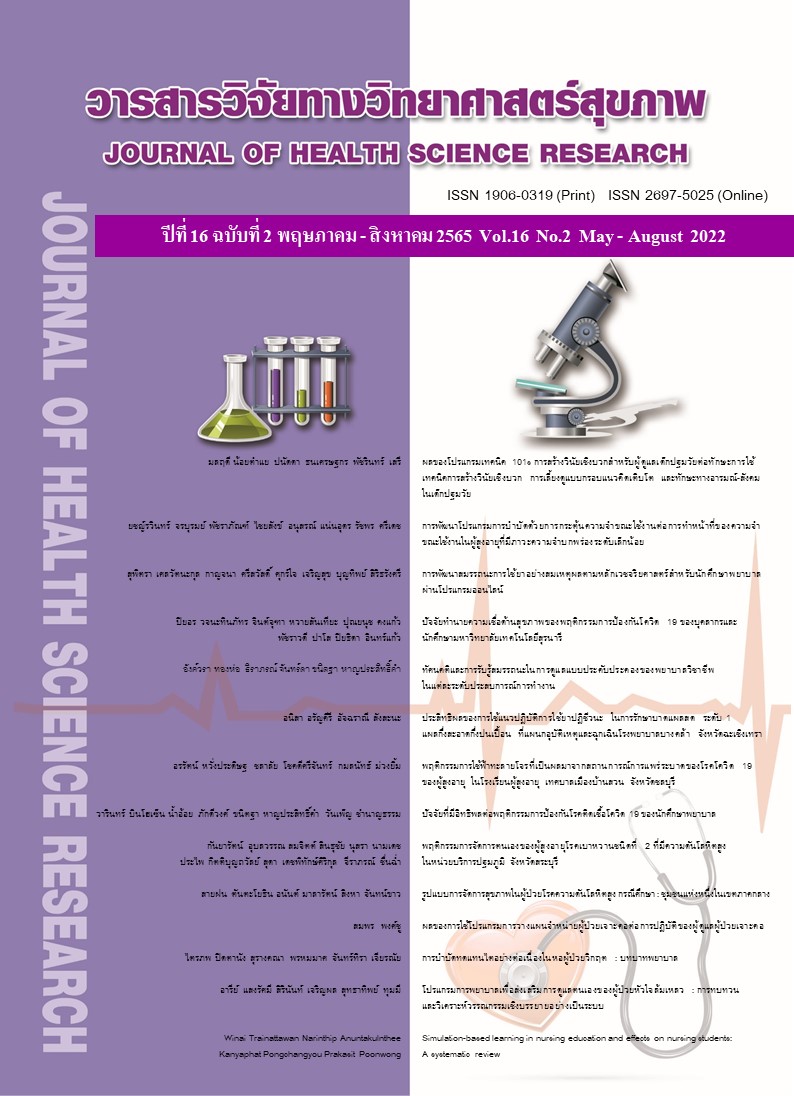ผลของโปรแกรมเทคนิค 101s การสร้างวินัยเชิงบวกสำหรับผู้ดูแล เด็กปฐมวัยต่อทักษะการใช้เทคนิคการสร้างวินัยเชิงบวก การเลี้ยงดู แบบกรอบแนวคิดเติบโต และทักษะทางอารมณ์-สังคมในเด็กปฐมวัย
Main Article Content
บทคัดย่อ
บทนำ : ผู้ดูแลเด็กปฐมวัยเป็นบุคคลสำคัญในการส่งเสริมพัฒนาทักษะทางอารมณ์และสังคมของ
เด็กปฐมวัย โปรแกรมเทคนิค 101s การสร้างวินัยเชิงบวกเป็นวิธีการหนึ่งที่ช่วยให้ผู้ดูแลเด็กปฐมวัยส่งเสริมทักษะดังกล่าว
วัตถุประสงค์การวิจัย : ศึกษาผลของโปรแกรมเทคนิค 101s การสร้างวินัยเชิงบวกสำหรับผู้ดูแลเด็กปฐมวัยต่อทักษะการใช้เทคนิคการสร้างวินัยเชิงบวก การเลี้ยงดูแบบกรอบแนวคิดเติบโต และทักษะทางอารมณ์-สังคมในเด็กปฐมวัย
วิธีการวิจัย : การวิจัยกึ่งทดลองแบบกลุ่มเดียววัดผลก่อนและหลัง ตัวอย่าง คือ ผู้ดูแลเด็กปฐมวัย จำนวน 19 คน และเด็กปฐมวัย อายุ 2-4 ปี ที่สถาบันพัฒนาอนามัยเด็กแห่งชาติ จำนวน 19 คน เครื่องมือที่ใช้ คือ 1) โปรแกรมเทคนิค 101s การสร้างวินัยเชิงบวกสำหรับผู้ดูแลเด็กปฐมวัย 2) แบบสอบถามข้อมูลทั่วไป
3) แบบวัดการฝึกวินัยที่ผู้ดูแลเด็กปฐมวัยใช้กับบุตร 4) แบบวัดการเลี้ยงดูแบบกรอบแนวคิดเติบโต และ 5) แบบวัดทักษะด้านอารมณ์-สังคม และตรวจสอบความตรงด้านเนื้อหา เท่ากับ 1 หาค่าความเที่ยงโดยใช้สัมประสิทธิ์แอลฟาของครอนบราค เท่ากับ .80 - .90 วิเคราะห์ข้อมูลโดยใช้สถิติเชิงพรรณนา และทดสอบค่า ที
ผลการวิจัย : ค่าเฉลี่ยคะแนนทักษะการใช้เทคนิคการสร้างวินัยเชิงบวก พฤติกรรมการเลี้ยงดูแบบกรอบแนวคิดเติบโตของผู้ดูแลเด็กปฐมวัยหลังอบรมสูงกว่าก่อนอบรม และทักษะทางอารมณ์-สังคมของเด็กปฐมวัยหลังการใช้โปรแกรมสูงกว่าก่อนการใช้ อย่างมีนัยสำคัญทางสถิติ (p<.05)
สรุปผล : โปรแกรมเทคนิค 101s การสร้างวินัยเชิงบวกสำหรับผู้ดูแลเด็กปฐมวัย เป็นเครื่องมือที่นำไปใช้ในการส่งเสริมพัฒนาการเด็ก และลดปัญหาพฤติกรรมในเด็กปฐมวัยได้อย่างมีประสิทธิภาพ
Downloads
Article Details

อนุญาตภายใต้เงื่อนไข Creative Commons Attribution-NonCommercial-NoDerivatives 4.0 International License.
บทความที่ได้รับการตีพิมพ์เป็นลิขสิทธิ์ของวิทยาลัยพยาบาลบรมราชชนนี จังหวัดนนทบุรี
ข้อความที่ปรากฏในบทความแต่ละเรื่องในวารสารวิชาการเล่มนี้เป็นความคิดเห็นส่วนตัวของผู้เขียนแต่ละท่านไม่เกี่ยวข้องกับวิทยาลัยพยาบาลบรมราชชนนี จังหวัดนนทบุรี และคณาจารย์ท่านอื่น ในวิทยาลัยฯ แต่อย่างใด ความรับผิดชอบองค์ประกอบทั้งหมดของบทความแต่ละเรื่องเป็นของผู้เขียนแต่ละท่าน หากมีความผิดพลาดใด ๆ ผู้เขียนแต่ละท่านจะรับผิดชอบบทความของตนเองแต่ผู้เดียว
เอกสารอ้างอิง
Booncherdchoo SL., Klinhaul M. The field trip activities enhance learning competency of young children in the 21st century. Veridian E-Journal, Silpakorn University. 2016;9(3):1550-62. (in Thai).
Chano J. Executive functions and early childhood development. Journal of Education, Mahasarakham University. 2019;13(1):7-17. (in Thai).
Heckman J, Pinto R, Savelyev P. Understanding the mechanisms through which an influential early childhood program boosted adult outcomes. Am Econ Rev. 2013;103(6):2052-86. doi: 10. 1257/aer.103.6.2052.
Yan VX, Thai KP, Bjork RA. Habits and beliefs that guide self-regulated learning: Do they vary with mindset? J. Appl. Res. Mem. 2014;3(3):140–52. doi: 10.1037/h 0101799.
Xu KM, Koorn P, Koning B, Skubualla I, Lin L, et al. A growth mindset lowers perceived cognitive load and improves learning: Integrating motivation to cognitive load. J. Educ. Psychol. 2021; 113(6):1177–91. doi. 10.1037/edu0000631.
O'Rourke E, Haimovitz K, Ballweber C, Dweck C, Popovic Z. Brain points: A growth mindset incentive structure boosts persistence in an educational game. In CHI 2014: One of a Chind - Conference proceedings, 32nd annual ACM conference on human factors in computing systems.26 Apr. -1 May 2014; Canada. Toronto; p.3339-48. doi. 10.1145/2556288.2557157.
Hadipoor M, Jomehri F, Ahadi H. The effect of mothers’ training program based on Dweck’s intelligence mindset theory on learning behaviors of 4-6 years old children. Educ Psychol. 2016;11(38):1-25.
Seamkhumhom D, Chaiyawut P, Wanngamwiset S, Thienphuridej T. Promoting to executive functions in preschool children. Journal of MCU Nakhondhat. 2020;7(10):15-31. (in Thai).
Xiao SX, Spinrad TL, Carter DB. Parental emotion regulation and preschoolers’ prosocial behavior: The mediating roles of parental warmth and inductive discipline. J Genet Psychol. 2018;179(5):246–55. doi: 10.1080/00221325.2018.1495611.
Durrant JE. Positive discipline in everyday parenting (PDEP). In book: Ending the physical punishment of children: A guide for clinicians and practitioners; 2020:89-97. doi: 10.1037/0000162-010.
Chutabhakdikul N, Thanasetkorn P, Lertawasdatrakul O, Ruksee N. Tool development and evaluation criteria for assessment of executive function in early childhood [internet]. 2017 [cited 2021 May 17]; Available from: https://kb.hsri.or.th/dspace/ handle/11228/4650?show=full. (in Thai).
Cohen J. Statistical power analtsis for the behavioral sciences (2nded.). Hillsdale. NJ: Lawrence Earlbaum Associates. 1988.
Thanasetkorn P. The preliminary research study on the impact of the 101s: a guide to positive discipline parent training on parenting practices and preschooler’s executive function. Asia-Pac. J. Res. Early Child. Educ. 2015;9(1):65-89. doi: 10.172 06/apjrece.2015.9.1.65.
Lively S. What positive parents need to know about growth mindset. [internet]. 2017 [cited 2021 May 18]; Available from: https://onetimethrough.com/what-positive-parents-need-to-know-about-growth-mindset.
Sutipan P. Chumchua V, Chutabhakdikul N, Thanasetkorn P. The impact of the 101s positive discipline teacher training on teacher practices and preschoolers' executive function skills. Proceedings: The 1st ASEAN plus three graduate research congress. Paper presented at The 1st ASEAN plus three graduate research congress, 1st-2nd March 2012; Chiang Mai, Thailand; p19–24. (in Thai).
Pichitkusalachai P, Sutipan P, Chumchua V, Thanasetkorn P. Self-regulation in Thai preschoolers: The Impact of the 101s positive discipline teacher training on teacher interaction practices and children’s self-regulation in Thailand. Paper presented at the International Society for the Study of Behavioural Development (ISSBD) 2012 Biennial Meeting Conference, University of Alberta, Edmonton, 8-12 July 2012; Alberta, Canada.
Dweck CS, Yeager DS. Mindsets: a view from two eras. Perspect Psychol Sci. 2019;14(3):481-96. doi: 10.1177/1745691 618804166.
Gal E, Szamoskozi S. The association between implicit theories of intelligence and affective states: A meta-analysis. Transylvanian Journal of Psychology. 2016;17(1):45-70. doi: 10.19265/KP.2019.213129.
Themkumkwun P, Chutabhakdikul N, Ruksi N, Thanasetkorn P. The 101s storybooks intervention program to promote executive function development in preschool: The case study in Thailand. Proceedings of INTED2017, the 11th annual international technology, education and development conference, 6th-8th March 2017; Valencia, Spain; p4179-87.


